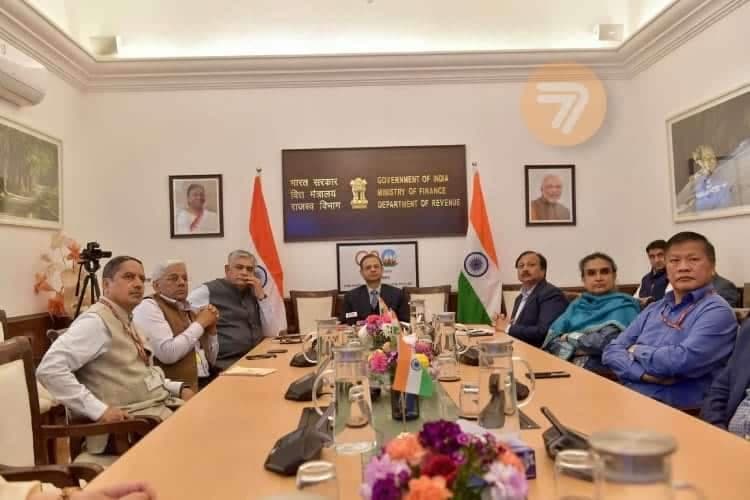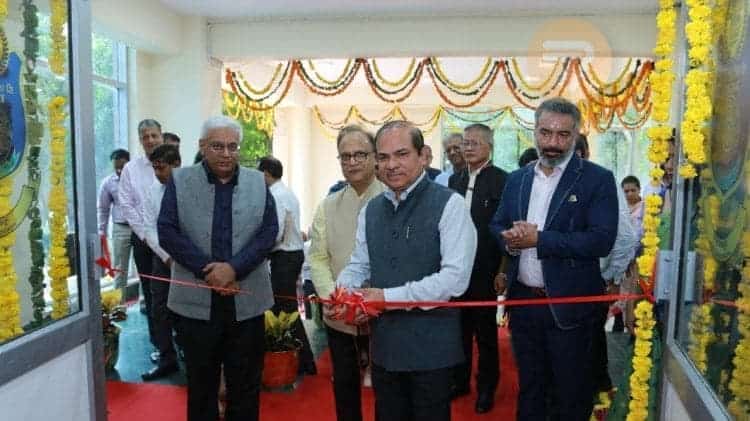Center Fighting to Make Room for Online Gaming Cash Cow
03 Apr 2024
Banning Offshore Money Gaming URLs “a Continuous Exercise”
A knowledgeable yet anonymous source recently revealed to the media that blocking unregistered offshore online gambling platforms “will remain a continuous exercise” for the Center. The source disclosed details on the measures taken by GST authorities to curb money flows to offshore gambling and betting operators.
According to the report, hundreds of such domain names are under the government’s radar; some are still under investigation, while many have already been blocked, and even more non-complying URLs will soon be subject to the same measures.
Around the beginning of March, GST authorities produced a list of 110 URLs that allegedly offered money games to Indian customers without the proper registration required by the latest amendments to GST laws. They gave the list to the Ministry of Electronics & IT (MeitY) with the request to block them.
Towards the end of the month, 60 new URLs were added to the list, while 60 URLs from the original batch had already been blocked. The rest are now being investigated by the Indian Cybercrime Coordination Centre (I4C), an enforcement body under the Ministry of Home Affairs.
Pressure Building Up on the Homegrown Industry
Locally offered money games now charge 28% GST on entry-level deposits, while foreign platforms are required to get GST registered and pay the same taxes to level the playing field between foreign and domestic operators.
“The 28% GST will severely hurt this sunrise sector with huge potential. It needs parity with global tax rates of 10-15% to survive, else unlawful offshore sites will gain traction,” Girish Menon, Partner, and Head of Media & Entertainment at KPMG India, recently explained how the local high tax rates were putting pressure on the homegrown money gaming industry.
No foreign platforms have yet opted to register for Indian GST
With no foreign platforms having yet opted to register for Indian GST, the Center is focusing on keeping money gaming sites that pay lower taxes abroad out of the picture by way of blocking domain names. The task is proving difficult, because these platforms keep changing their URLs, and, in practice, the whole thing is turning into an endless game of whack-a-mole.
As the anonymous source has hinted, the Center expects that the efforts to block such sites will continue indefinitely, and authorities are prepared to keep issuing blocking orders as needed.
Fiscal revenues from GST on online money games in the first three months after the new GST levy was implemented jumped nearly sixfold, from ₹605 crore to ₹3,470 crore, making it clear as to why the government aims to preserve Indian online space for GST-registered and paying operations only.
“So from Rs 1,600 crore in 2022-23 to more than Rs 7,000 crore this year is expected, and Rs 14,000 crore next year if we are able to get the same rate we got in the first three months after implementation of the revised tax rates,” current Revenue Secretary Sanjay Malhotra pointed out.

This Cabinet Will Not Review GST on Online Games
The 1st of April 2024 marked six months after the implementation of the new tax regime, which came into force on the 1st of October 2023 and put the homegrown money gaming industry under pressure from all sides. However, the long-awaited review of the levy will not happen any time soon.
On the one hand, the upcoming national elections (19 April – 1 June 2024) have put a hold on any hopes that might have existed within industry stakeholders that the fresh 28% GST on the full value of deposits might be reconsidered now.
The Model Code of Conduct requires that no major decisions be taken three months before the Union elections. This leaves any policy changes on the matter for a GST Council chaired by the next Union Minister of Finance.
Regardless of expectations that it will be the same cabinet under Prime Minister Narendra Modi’s third term in office, any review of the GST regime will have to wait until that becomes a fact.
The eagerly expected review does not necessarily mean the GST rate slab or valuation rules will go down, as Revenue Secretary Malhorta clarified at the beginning of March. According to his words, the review will only assess the current tax scenario and see if any minor adjustments are necessary.
Pending Supreme Court Litigation also Puts a Hold on GST Review
On the other hand, the pending mega litigation before the Supreme Court of India, which now includes under its ambit all individual cases between gaming companies and bodies and the government on the issue of GST dues before October 2023, also puts a hold on any GST policy changes until resolved.
“No further change can be made to the tax regime for online money gaming as the matter is subjudice. One has to wait for the Supreme Court’s views on the matter,” another knowledgeable but anonymous source was recently quoted by the media, speaking about the current views among Union and State policymakers.
According to the same source, Goa and Sikkim, the two states with licensing regimes for brick-and-mortar casinos or some forms of online gambling, have been pushing for a review of the GST regime to be initiated.
With the next hearings expected after the Supreme Court’s summer break in July, any reviews on the existing GST regime will be further delayed and might take a full year or more instead of the originally planned six months.
Industry Is Getting Creative with New Tactics to Cope with the Tax Challenge
Immediately after the hiked GST came into effect six months ago, some of the largest Indian operators started absorbing the impact of the new levy by offering corresponding discounts to consumers. This practice soon became the norm, with operators like Delta Corp, whose initial strategy was to sit and wait, joining a couple of months later.
In the meantime, Indian online money gaming companies have been getting increasingly creative, trying to spare some margin as the fixed costs to run a business cannot wait, and no cash reserves are limitless.

“We have not passed on the tax liability yet and the impact on the consumer is minimal. But the business needs to make sense. And we do plan to pass on the tax burden to the customers. And optimize it gradually and do it in a fashion that the consumer engagement is not impacted.” Baazi Games co-founder Saurabh Chopra explained how a company may hope to survive the times.
No company has yet dared to “pass on the tax liability”
While no company has yet dared to “pass on the tax liability” to its consumers. One way to “optimize the tax burden” is to adjust the withdrawal policies. Because GST is charged on each deposit and not on each wager.
For fast card games like rummy and poker, limiting daily withdrawals to 15-20 per month. After which requests are implemented with a 24-hour delay. Or withdrawal restrictions on heavy traffic days like Sundays. That has been enough to make a difference for some operators.
With large-scale online fantasy sports operations, withdrawals are much less frequent. But around two-thirds of players win small amounts. These are at least equal to their deposits. Playing around with the minimum win threshold has appeared to be the key for some big businesses like Dream11.
“A change of about 5% in the minimum winnings bracket does not bother the userbase much. But that delta translates to a huge sum of money. Especially from large format games with tens of thousands or lakhs of players.” A senior source from the industry pointed out.

“The customer does not have the time to sit and understand. Understand why we are taxing them more or charging higher commissions. So it is boiling down to reworking things from the product-market fit level.” Siddharth Sharma, Senior Vice President at Head Digital Works, explained.
The undergoing Indian Premier League season will probably see much more experimenting. This experimentation pertains to margin seeking. As it becomes clear that the industry will need to cope indefinitely with the present tax situation.
My War Chest Is Bigger Than Your War Chest
When no more acrobatics with the Terms & Conditions can save enough sustainability. Selling the business to a bigger fish might be the solution.
OneVerse, a metaverse and gaming tech company, has prepared an initial war chest. It contains of $120 million (₹1,000 crore). OneVerse plans to acquire 13 gaming businesses to accompany a ₹250 crore investment in growth capital.
In February, OneVerse purchased Spartan Poker and later added another poker platform. That platform was Callin Station. As well as a fantasy sports platform. That platform is BatBall11. These platformes were added to its portfolio of money gaming businesses that suffered from the GST hike.
The consolidation tactic is expected to save around 15% of the company’s operational costs. As gaming businesses typically spend 20% of their top line on marketing. As well as staff, technology, and other running expenses.
The negative impact of GST
“We are able to offset the negative impact of GST and as a larger company. We are able to access a larger capital pool in terms of investor growth funds. Meaning that we can grow faster as a portfolio company than an individual firm. There will be a lot of consolidation at an operating level with cost efficiencies that will build in.” OneVerse founder Prashanth Joshua said.
“India as a tech nation is catching up. And I think there is a lot of nascency in many sectors which are unregulated where we are disrupting things. But once it becomes large enough. Then the government steps in to regulate them. And that is painful,” Harsh Jain is CEO and co-founder of Dream Sports. A company which cut its profit expectations for FY2024 by 80%. Due to the GST hike. He commented during a panel discussion at the Mumbai Tech Week in February.
“I’m not hiding behind the fact that as an unregulated disruptor, we can grow faster. But I think it’s great that the government is stepping in. Because they come at a time when people are doing too many things in the name of disruption,” he added.



